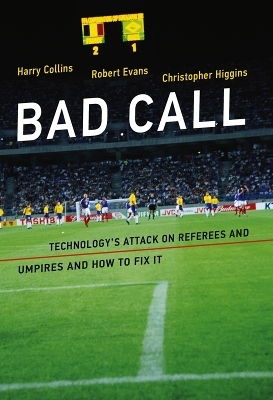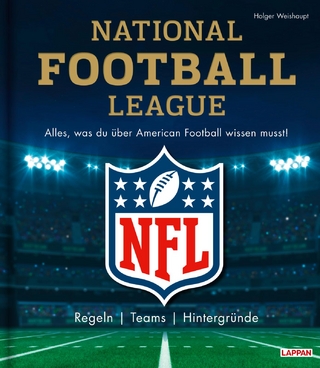
Bad Call
Technology's Attack on Referees and Umpires and How to Fix It
Seiten
2016
MIT Press (Verlag)
978-0-262-03539-2 (ISBN)
MIT Press (Verlag)
978-0-262-03539-2 (ISBN)
- Titel ist leider vergriffen;
keine Neuauflage - Artikel merken
How technologies can get it wrong in sports, and what the consequences are-referees undermined, fans heartbroken, and the illusion of perfect accuracy maintained.
Good call or bad call, referees and umpires have always had the final say in sports. Bad calls are more visible: plays are televised backward and forward and in slow motion. New technologies-the Hawk-Eye system used in tennis and cricket, for example, and the goal-line technology used in English football-introduced to correct bad calls sometimes get it right and sometimes get it wrong, but always undermine the authority of referees and umpires. Bad Call looks at the technologies used to make refereeing decisions in sports, analyzes them in action, and explains the consequences.
Used well, technologies can help referees reach the right decision and deliver justice for fans: a fair match in which the best team wins. Used poorly, however, decision-making technologies pass off statements of probability as perfect accuracy and perpetuate a mythology of infallibility. The authors re-analyze three seasons of play in English Premier League football, and discover that goal line technology was irrelevant; so many crucial wrong decisions were made that different teams should have won the Premiership, advanced to the Champions League, and been relegated. Simple video replay could have prevented most of these bad calls. (Major League baseball learned this lesson, introducing expanded replay after a bad call cost Detroit Tigers pitcher Armando Galarraga a perfect game.)
What matters in sports is not computer-generated projections of ball position but what is seen by the human eye-reconciling what the sports fan sees and what the game official sees.
Good call or bad call, referees and umpires have always had the final say in sports. Bad calls are more visible: plays are televised backward and forward and in slow motion. New technologies-the Hawk-Eye system used in tennis and cricket, for example, and the goal-line technology used in English football-introduced to correct bad calls sometimes get it right and sometimes get it wrong, but always undermine the authority of referees and umpires. Bad Call looks at the technologies used to make refereeing decisions in sports, analyzes them in action, and explains the consequences.
Used well, technologies can help referees reach the right decision and deliver justice for fans: a fair match in which the best team wins. Used poorly, however, decision-making technologies pass off statements of probability as perfect accuracy and perpetuate a mythology of infallibility. The authors re-analyze three seasons of play in English Premier League football, and discover that goal line technology was irrelevant; so many crucial wrong decisions were made that different teams should have won the Premiership, advanced to the Champions League, and been relegated. Simple video replay could have prevented most of these bad calls. (Major League baseball learned this lesson, introducing expanded replay after a bad call cost Detroit Tigers pitcher Armando Galarraga a perfect game.)
What matters in sports is not computer-generated projections of ball position but what is seen by the human eye-reconciling what the sports fan sees and what the game official sees.
Harry Collins is Distinguished Research Professor of Sociology and Director of the Centre for the Study of Knowledge, Expertise, and Science at Cardiff University. A Fellow of the British Academy, he is the author of Gravity's Shadow; Gravity's Ghost; Gravity's Ghost and Big Dog; Gravity's Kiss: The Detection of Gravitational Waves (MIT Press); and many other books. Robert Evans is Personal Chair in the Cardiff School of Social Sciences. Christopher Higgins is a PhD candidate at Cardiff University.
| Erscheinungsdatum | 10.11.2016 |
|---|---|
| Reihe/Serie | Bad Call |
| Zusatzinfo | 26 b&w illus. |
| Verlagsort | Cambridge, Mass. |
| Sprache | englisch |
| Maße | 137 x 203 mm |
| Themenwelt | Sachbuch/Ratgeber ► Sport ► Ballsport |
| Naturwissenschaften | |
| ISBN-10 | 0-262-03539-1 / 0262035391 |
| ISBN-13 | 978-0-262-03539-2 / 9780262035392 |
| Zustand | Neuware |
| Informationen gemäß Produktsicherheitsverordnung (GPSR) | |
| Haben Sie eine Frage zum Produkt? |
Mehr entdecken
aus dem Bereich
aus dem Bereich
Buch | Hardcover (2024)
Lappan (Verlag)
25,00 €
Geschichten deutscher Basketball-Legenden : Schrempf, Nowitzki, …
Buch (2024)
Eulogia Verlags GmbH
22,00 €


